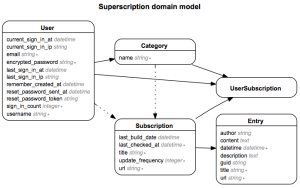 Monday 14 October 2013— I'll confess that I didn't have a productive weekend at all. No excuses; I just got distracted. You could argue (I won't, but you can) that it's perfectly healthy and fine to take some well-earned relaxation on one's days off, but even relaxation is something that can be done better or worse: hours of the latest ephemeral internet amusements are probably much less rejuvenating than hours of ... I don't know, some sort of activity that doesn't involve sitting in front of a monitor?—I presume such things still exist even if I can't remember them anymore.
Monday 14 October 2013— I'll confess that I didn't have a productive weekend at all. No excuses; I just got distracted. You could argue (I won't, but you can) that it's perfectly healthy and fine to take some well-earned relaxation on one's days off, but even relaxation is something that can be done better or worse: hours of the latest ephemeral internet amusements are probably much less rejuvenating than hours of ... I don't know, some sort of activity that doesn't involve sitting in front of a monitor?—I presume such things still exist even if I can't remember them anymore.
Still no deal in the BART contract talks; I took an evening train and slept at the office last night because we didn't know whether there would be trains in the morning. As it turns out, there were, but there likely won't be tomorrow. A moment of amusement is provided by imagining what kind of vicious and histrionic things a frustrated commuter might say if they were angry ("Curse the unions! Curse anyone who won't curse the unions! Curse anyone who won't put a light in their window and sit up all night cursing the unions! Let management fire them and hire scabs! Let hackers insert their names into the public sex-offender registry!" &c.), but in truth, I ain't even mad. (This is in accordance with policy; even if we were to suppose that I somehow knew how the labor dispute should ("should") be resolved, it would still be a waste of cognition to think about it unless we were also to suppose that people care what I think—and that's ridiculous.)
Today we did solo work on an application to keep track of musical artists and their associated albums and tracks, in the process gaining some more practice with authentication and learning about ActionMailer.
Tomorrow there's an assessment scheduled, and I really ought to have taken the time on the weekend to go through the posted practice-assessment, because I looked at it this evening, and somehow getting the specs to pass is much more difficult than I would have imagined. I may have a slight attitude problem: I tend to hold the entire idea of "studying for a test" in contempt (for surely we should study exactly the things that are worth knowing, tests merely being a instrumentally useful device for measuring what we have retained), but this is probably an error of modeling myself as having more agency than I actually have. All principles and rhetoric aside, we can predict that if I had studied for the test last week, then I wouldn't have forgotten the HAVING clause, but I didn't, so I did.
And that's terrible.
Continue reading →




